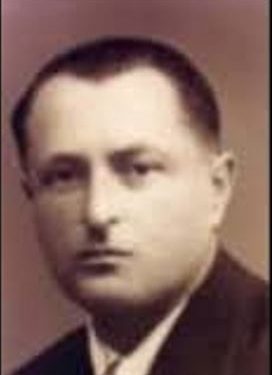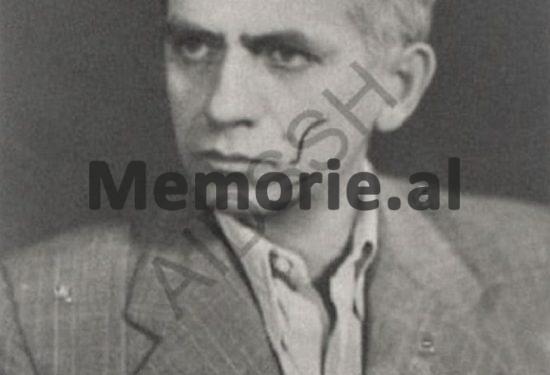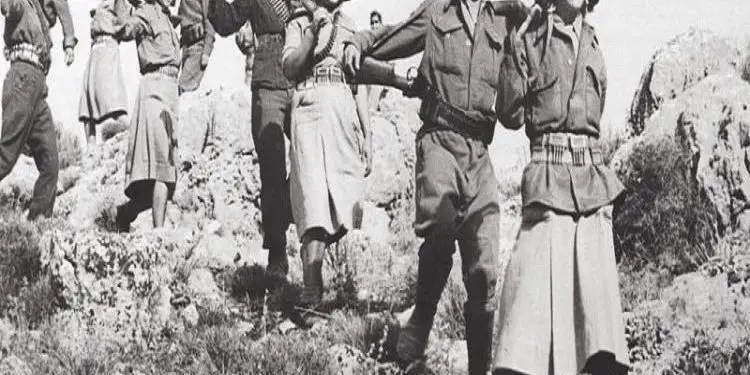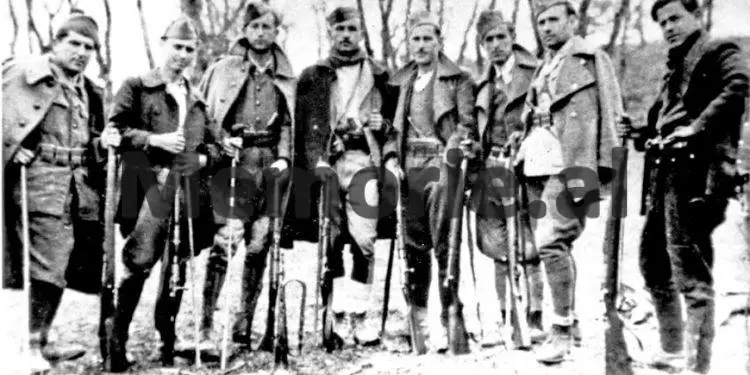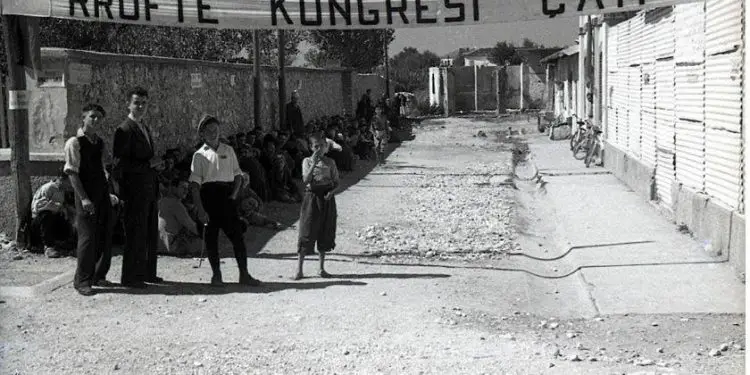From Hyqmet ZANE
-The Anti-Fascism of the Cham People and the Konispol Agreement, August 1944 –
Memorie.al / Historical testimonies that nations have written are immortal and stand as indicators of truth that confront any distortions attempted by various malicious circles and the circumstances of the time. When it comes to the relations between Albanians and Greeks, the mind inevitably turns to the most debated and denigrated issue, namely the Cham issue and the Greek genocide against Çameri.
Those who attest to this are the eyewitnesses who suffered the genocide, the mothers and children, the fathers and grandparents, the European chancelleries, and the Greeks themselves who perpetrated the massacres in those final years of World War II.
A lot has been said and written about this issue, and many declarations have been made. One of those so-called Greek claims that seeks to justify the massacres and inhuman genocide is the absurdity of the “collaboration of the Chams with the occupier during World War II.”
We have often spoken and provided evidence to refute such ultra-nationalist Greek claims, such as the fact that my father (Nuri Emin Zane, Hajri Hasan Fetahu, Osman Zenel Taka, and Mezan Jonuzi) and many others became victims of persecution in internment camps in Germany, as well as of Greek and communist persecution in Albania.
But more than that, there is also another historical document as proof of the truth about the position of the Albanians of Çameri during World War II, namely the “Konispol Agreement.”
The Konispol Agreement
On August 10, 1944, a joint meeting was held between the representatives of the Liberation Front of Çameri and the representatives of the Greek Liberation Front (EAM), as well as the delegation of the Gjirokastër District Committee of the Albanian Communist Party (PSSH), to address the issues of the Albanian minority in Greece and the Greek minority in Albania.
The meeting made the following decisions:
Due to century-old prejudices, repeated mistakes, the crimes of some malefactors, and the chauvinistic propaganda of some circles, a situation has been created for the Albanian and Greek minorities, which is leaving considerable forces neutral, opposing to one another, and consequently powerless for participation in the anti-fascist struggle being fought by both peoples, the Greeks and the Albanians.
Signs of recent days indicate that disaster is imminent unless those close to the events open their eyes and take action.
Creating an anti-fascist organization for every minority is an urgent necessity. Such a predisposition has clearly manifested itself from the Greek minority and is also felt alive among the same subjects in Çameri.
The establishment of respective anti-fascist organizations also silences the chauvinists who speak of national betrayal.
This solution on the path of today’s struggle for liberation and self-determination of the peoples will unite the two neighboring peoples. This is the only suitable and fruitful way.
The anti-fascist organizations will be led by a council composed of one Albanian representative, one Greek, and one representative from the minority.
For both parties, there will also be a representative from the British mission on the Council. The latter will participate only if requested by the minority.
The same method will be applied to military organization.
A full amnesty is granted to all those who, through their behavior, both in political activity and in private life, have served fascism and chauvinism.
Both organizations, Greek and Albanian, guarantee for today and the future the life, honor, and property of the minority peoples.
This decision will be communicated to both peoples and will be implemented from today. It will also be reported to the higher organizations.
The statutes of the anti-fascist organizations of the minorities will include clauses for the active participation of both peoples in the struggle. In addition to anti-fascist propaganda, any other propaganda, including chauvinistic, is prohibited.
The press of both organizations will assist in the political education of the peoples and both minorities.
For the Liberation Front of Çameri
Rexhep Plaku
For EAM For PKSH
Aleksis Janaris “Çeliku”
It must be stated with truthfulness and documentary competence that this document was published for the first time in the book “The Anti-Fascist Organization of the Greek Minority in Albania 1943-1944” by author Aleksis Janaris and was republished in the nationalist brochure “Unknown Moments from the Drama of Epirus” in 1989. It should also be noted that Aleksis Janari is a pseudonym for Miltjadhi Qiriani, while “Çeliku” is Bedri Spahiu.
On the other hand, it is important to affirm that the “Konispol Agreement” serves as another piece of evidence that disproves the Greek accusations against the martyred population of Çameri as collaborators with the Nazi-fascist occupiers.
Even before and after this meeting, the population of Çameri aligned itself with the ranks of the anti-fascist movement both within the formations of the Greek EAM-ELAS and in the National Liberation Movement of Albania.
Following this agreement, the representatives of Çameri gathered in the village of Shalës in Konispol at the First Congress and formed the organization named “Çam Anti-Fascist Council,” as the only representative organization of the Çameri population. This organization defended the interests of the Çameri population even after World War II, until 1948.
It is a historical fact that the Greek minority in Albania supported the National Liberation War of the Albanian people, but the contribution and participation of the Çameri population was even greater and materialized in several units and fighting formations.
Although the Greek governments deny or keep hidden the contributions of the Albanians of Çameri, as well as their participation in the ranks of the Anti-Fascist Movement of the Greek people, it is a historical fact that in the 8th Division of ELAS, the 15th Regiment, there was the so-called “mixed” battalion (Albanian-Greek), which included and fought over 500 partisans from the Çameri population.
In Albania, we also have representatives of this population on both sides of the Albanian-Greek border, who aligned themselves with the ranks of Albanian fighting formations, such as the “Çameria” Battalion and various brigades, where dozens of Çameri Albanians lost their lives.
It is also a fact that the creation of the Çam Anti-Fascist Committee is the best historical response this population has given to the Konispol Agreement, while within the Greek minority in Albania, there does not exist such an organization.
Moreover, as demonstrated by this document of considerable historical value, which the Greek author himself brings to light, the Greek minority is not presented as a signatory and directly participating party in this document, unlike the participation and signature of Rexhep Plaku, the representative of the Liberation Front of Çameri.
This document completely sheds light on the time when the Albanians of Çameri were unjustly accused and violently expelled from their homes collectively, and continue to be politically persecuted by the current Greek state and by those who were supposed to protect them.
At the same time, the publication of this document is an indictment of those responsible for the Liberation Wars of both peoples, who have remained silent and continue to do so, failing to meet the obligations stemming from the tripartite agreement signed in 1944 regarding the protection of the lives and property of minority peoples.
Epilogue
The occasional documentation carried out by Cham scholars, especially, but also occasionally by other scholars, shows a significant difference in their presentation. At the same time, there is a major shortcoming not in their content, but in the lack of support from the Academy of Sciences of the Republic of Albania.
The unusual shortcoming for a high non-political institution lies in the fact that these documents have never been addressed or summarized in favor of the broader national issue, so that this Academy speaks first in the name of the truths that circulate as isolated, in a troubled atmosphere.
There are many questions that need to be scientifically addressed and elaborated on regarding the national territories outside the borders of Albania, which have never been valued as such.
Contrary to this Academy stand the Academies of Greece and Macedonia, Serbia, and Montenegro, which do not miss an opportunity to provide scientific and documentary responses to the problems presented, even if it means fabricating against the Albanians.
In this context, I assert that Cham scholars, including one of the most dedicated among them, the esteemed 91-year-old professor Ibrahim Daut Hoxha, who has single-handedly produced two South-Albanian encyclopedias as monuments of truth and which serve as reference points even for the Albanian Academy, play a crucial role.
Perhaps the time has come to raise our voice as Chams through an institution such as the Academy of Sciences of the Republic of Albania, which until now has intentionally remained deaf and mute regarding issues of great national interest. Memorie.al





